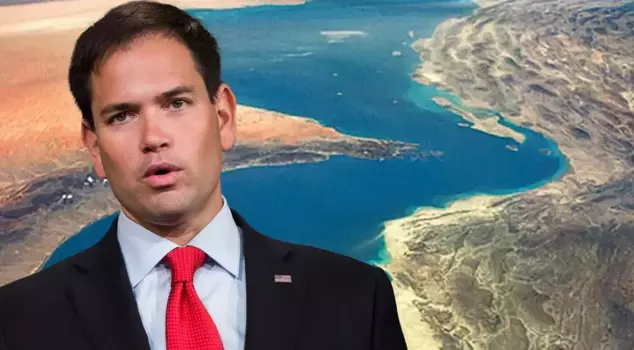
22.06.2025 19:41
Following the attacks by the U.S. Army, the Iranian Parliament approved the closure of the Strait of Hormuz. In a statement following Iran's decision, U.S. Secretary of State Marco Rubio said, "This would be a situation where China would pay a very high price. The same applies to other countries in the world. It would have an impact on us, but it would have a much greater impact on the rest of the world."
U.S. Secretary of State Marco Rubio stated that the possibility of the Tehran administration closing the Strait of Hormuz after an attack on Iran would affect the entire world, including the U.S. and China.
The U.S. also became involved in the Israel-Iran conflicts that began with Israeli attacks. The U.S. Army bombed Iran's nuclear facilities late last night.
IRAN'S DECISION ON THE STRAIT OF HORMUZ
After the U.S. became involved in the conflicts, a notable move came from Iran. The Iranian Parliament approved the closure of the Strait of Hormuz. Kevseri, a member of the Iranian Parliament's National Security Commission, stated, "The Parliament concluded that the Strait of Hormuz should be closed. However, the final decision rests with the Supreme National Security Council."
FIRST REACTION FROM THE U.S.
The first reaction from the U.S. to Iran's move came from Secretary of State Marco Rubio. Speaking on CBS's "Face the Nation" program, Rubio stated that the possibility of Iran closing the Strait of Hormuz is not an urgent issue for them at the moment, but in such a case, China should be the first to be upset.
"IT WOULD BE A DECISION THAT CHINA WOULD PAY A HEAVY PRICE FOR"
Rubio expressed that a large portion of China's oil passes through that route, saying, "Therefore, if (Iran) mines the Strait of Hormuz, China will be the most affected. This would be a situation where China would pay a heavy price. The same applies to other countries in the world. It would also have an impact on us, but it would have a much greater impact on the rest of the world. This would be a suicidal move for them because I believe that if they do this, the whole world will act against them," he said.
"WE DO NOT WANT REGIME CHANGE"
Rubio emphasized that they "do not want" a possible regime change in Iran, stating, "This is the decision of the Iranian people. They want to do this, but that is not what we are focused on."
Questioning why Iran feels the need to "bury something underground," Rubio asked, "Why do they have 60% enriched uranium? You do not need 60% enriched uranium. Countries with 60% uranium in the world are countries that possess nuclear weapons because they can quickly increase it to 90%." he evaluated.
Rubio stated that Iran does not have the "goal of going to the moon" with its space program, saying, "Is Iran going to the moon? No, they are trying to make intercontinental ballistic missiles (ICBMs)."
DECISION COULD STRAND U.S. NAVY IN BASRA
Meanwhile, before the decision was made, U.S. military officials stated that Iran has the necessary naval forces and other capabilities to close the Strait of Hormuz, and this move could strand all U.S. Navy ships in the Persian Gulf.
CARRIES 20 MILLION BARRELS OF OIL DAILY
The Strait of Hormuz, located between Iran and Oman and connecting the Persian Gulf to open seas, is known as one of the world's most critical oil transit points. According to the U.S. Energy Information Administration, approximately 20 million barrels of oil are transported through this narrow waterway daily.
OIL BARREL PRICE MAY EXCEED 100 DOLLARS
On the day the conflicts began, oil prices had risen to as high as 78 dollars per barrel. According to experts commenting to Western media, with the closure of the strait, this price could exceed 100 dollars.
ABOUT A QUARTER OF WORLD OIL SUPPLY COMES FROM HORMUZ
The International Energy Agency (IEA) warned in a report published today that approximately a quarter of the world's oil supply passes through this strait, stating, "Even a temporary closure of the strait would have a significant impact on global oil and natural gas markets."